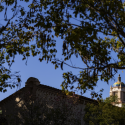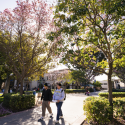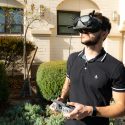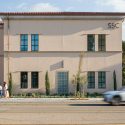New Hands-On Aquaponics Lab Teaches Students the Future of Horticulture
Fullerton College students will have an opportunity to learn about the latest trends and research in urban farming thanks to a new aquaponics lab. Starting this fall semester, students taking Horticulture 255 F Hydroponics/Aquaponics will learn in a hands-on laboratory the theory and practice of both types of crop production.
The class will provide students with undergraduate research opportunities by conducting research-based experiments, taking scientific measurements, analyzing data and presenting outcomes of research during the class, according to Horticulture faculty member Valerie Loew.
“Horticulture has evolved due to climate and resource changes, and we’re responding by adapting our program to become one that makes our students ready for the challenges ahead,” explained Loew.
Aquaponics is a system of crop production that has a low environmental impact, high water efficiency, and can boost production of crops in a minimal amount of space producing both fish and edible plant crops. It uses fish waste as plant nutrients and recycles water. Hydroponics is a highly productive system that uses nutrient laden water without soil.
With the creation of this new lab, Fullerton College becomes the first community college in Southern California to offer courses and hands-on training with aquaponics and hydroponics.
Seed money for the aquaponics program was provided by the Innovation Grant offered by the North Orange County Community College District. Every year, the district calls for proposals from faculty and staff about ideas and projects to improve student success. Recipients have one year to implement their proposals and then present information about the program to the Board of Trustees. Loew submitted a proposal for a new aquaponics lab and was one of four proposals that received from the $90,000 awarded through the grant.
Loew hopes to get students the training they need to be competitive in the future of horticulture and plant production. “Our plan is to close the achievement gap and make students competitive in the sciences,” Loew said. “The department will keep moving forward, teaching ahead of the curve.”
Working with a local aquaponics farm, the Horticulture Department was able to build and install the aquaponics lab in a year which was custom built to be in ADA compliance. The lab allows students to get hands-on training while incorporating chemistry, biology, technology and other STEM fields into horticulture studies.
The Horticulture Department is offering HORT 255 F Hydroponics/Aquaponics this fall on Mondays and Wednesdays with units transferable to a California State University for credit.






